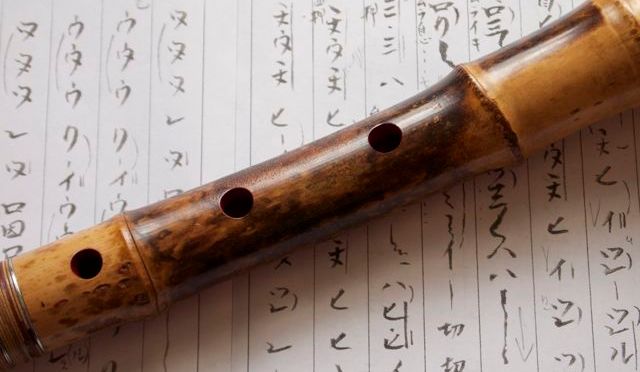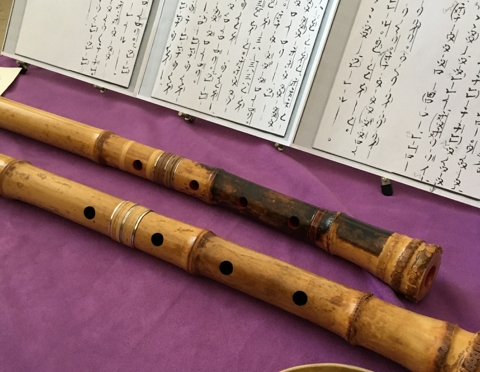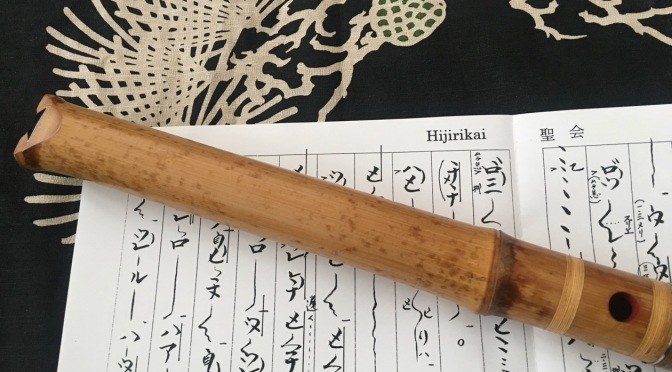I grew up in a catholic family and although I’m no believer myself, Christmas has always been for me an important symbol of peace and reconciliation. As a child, my favourite Christmas songs were those of The Poppys, a group of French children singing about love, world peace, and against war. I hadn’t listened to these songs for years, but they still move me while listening to them again so many years later, because there’re performed with all the faith and sincerity of children’ hearts, the very same feelings I had in my own child’s heart.
Continue reading Christmas Spirit
Monthly Archives: December 2016
Are there Japanese women playing shakuhachi?
I got this question from one of my (male) students during a workshop mainly attended by men. I couldn’t answer, as I actually don’t know any Japanese female shakuhachi player. All the Japanese masters I know are men. I do know some Western female professional shakuhachi players, but we’re not a lot, so the question is still open.
I recently heard of a book researching the history of shakuhachi through old pictures and paintings. This gave me the idea to do a little research myself. Here are some Ukiyo-e I found on the web, depicting women playing the shakuhachi, during the Edo period (17th-19th century). I’m now even more curious to know about these women playing shakuhachi at that time…






Update on May 9, 2019: Here is a link to a paper discussing this question.
5 good reasons to take lessons from a certified teacher
5 good reasons to take lessons from a certified teacher
- You will play at the proper pitch and don’t sound a semitone lower, blaming it on the flute.
- You will learn the specific techniques which make it unique.
- You will learn the traditional repertoire which is exclusively transmitted from master to student.
- You will meet fellow students, share your experience and play together.
- You will make progress.
6 good reasons to learn shakuhachi
6 good reasons to learn shakuhachi
1. It is a very special instrument: its sounds is unique and will open a new world for you.
2. It is a deep breathing training: bringing your awareness to your breath is relaxing and a deep breathing training is very good for your health. It will help you find a quiet moment for yourself.
3. It is a challenging instrument:
- physically: to get a sound, to keep it, to get the proper pitch.
- mentally: to go on and don’t give up because it’s more difficult than what you thought. You can do it.
- energetically: it’s a mirror of your energy level, and it will help you to improve it.
- spiritually: you’ll have to let go of your self and accept what is given by the flute. Playing the old traditional music is a spiritual act.
4. It is a very old tradition, which reaches people deeply.
5. It will improve your concentration in your daily life.
6. It will bring peace in your life. And you’ll be able to share this peace with the people around you by playing shakuhachi for them.
Azuma no kyoku
A duet-version of the honkyoku “Azuma no kyoku”. Playing with myself is actually a very efficient way of practicing. Hope you enjoy.
Amsterdam, March 5, 2016
A short video of my Shakuhachi Meditation concert at the Japanese Cultural Center of Amsterdam (NL). With city life background noise.
When do you practice?
When do you practice?
I usually practice in the morning. I feel fresh and it energises my day. I’m often very tempted to start other things first, but if I don’t, I never regret it, I’m more concentrated.
When I had a steady job with office hours, I used to practice before going to work or/and during the lunch break. In the evening, I had still to much to do and after that, I was too tired. I did it so because my job started quite late in the morning to late in the evening. If it had been the other way around, I should have done different.
There is no best time to practice, it depends on your daily schedule and obligations. As an amateur, you might have limited possibilities. As a professional, I try to practice when my energy is high and I can fully focus.
Playing music is quite physical, so you have to build up your condition like you’re sporting. It’s better to play for a short time regularly rather than once in while extensively.
Playing in the morning energises your day. Playing in the evening helps you to calm down, to let go of your day.
And you, when do you practice?
Welcome
Welcome to this blog, dedicated to the practice of shakuhachi and the Hijiri-ryu style. Let’s start a shakuhachi journey together!








